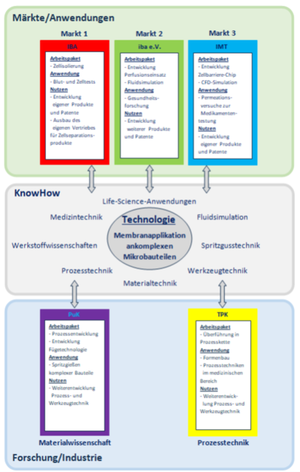(Short title: Membrane app)
Duration: 01.02.2021 - 31.01.2023
Membranes fulfill numerous technical functions and are ideally suited for the separation of compartments while ensuring mass transfer depending on the pore size and size of the molecules for which membrane permeability must be guaranteed. In particular, the properties of mass transport and exchange as well as microfluidics and hydrodynamic pore flow are of great interest for many applications in the biomedical field. The joining technology for the insertion of (micro)membranes for the separation of compartments in complex microstructured components, such as organ-on-a-chip models, as well as the joining technology in combination with the manufacturing technology represent a major challenge. The membrane itself is usually a porous film with specific properties that require careful handling in order to avoid membrane damage before use. With regard to the serial manufacturing process using variothermal micro-injection molding, joining the membrane with complex micro-components poses a particularly complex challenge due to minimal joining surfaces and geometric, process-related and application-specific conditions.
The joint project objective is to develop a joining technology for these challenges (in conjunction with the manufacturing technology, variothermal micro injection molding) and to make it usable with an economic approach. As part of this development, three specific products or biomedical applications of the partners, a module for cell separation including a separation matrix based on agarose/silica beads (IBA), perfusion inserts with and without an integrated multi-channel membrane system for the optimized fluidic supply of 3D cell culture models (iba e.V.) and a cell barrier chip with a focus on the flow channel design and cell compatibility of the membrane (IMT) were specifically developed to optimally combine the functionalities of the membrane and process requirements. The processes (joining technology and variothermal injection moulding) and the respective biomedical application as well as the required sterilization must be implemented in such a way that optimum efficiency can be achieved in conjunction with the manufacturing options. The focus of the joint project is on process and tool development at PUK and TPK. The aim is to combine all products in one injection mold. The technological development of joining technology also expands the range of manufacturing technologies in tool production and series production in the injection molding process. The jointly developed knowledge gain can be scaled to other applications and products of all partners and thus sustainably strengthens the knowledge and technology portfolio for the project partners in the market of the future.
The cooperation project is a joint venture between
- IBA GmbH
- Institute for Bioprocess and Analytical Measurement Technology e.V.
- Institute for Microtechnology at the TU Braunschweig
- Institute for Polymer Materials and Plastics Technology at TU Clausthal
- TPK Plastics Technology GmbH
The project is part of the research cluster "Polymer Systems, Microsensors and Biologization" at the Clausthal Center for Materials Technology (CZM), thus sharpening the research profile and the focus of the project.
The project is funded by the Central Innovation Program for SMEs (ZIM). Many thanks to the project management organization and all sponsors and supporters.
